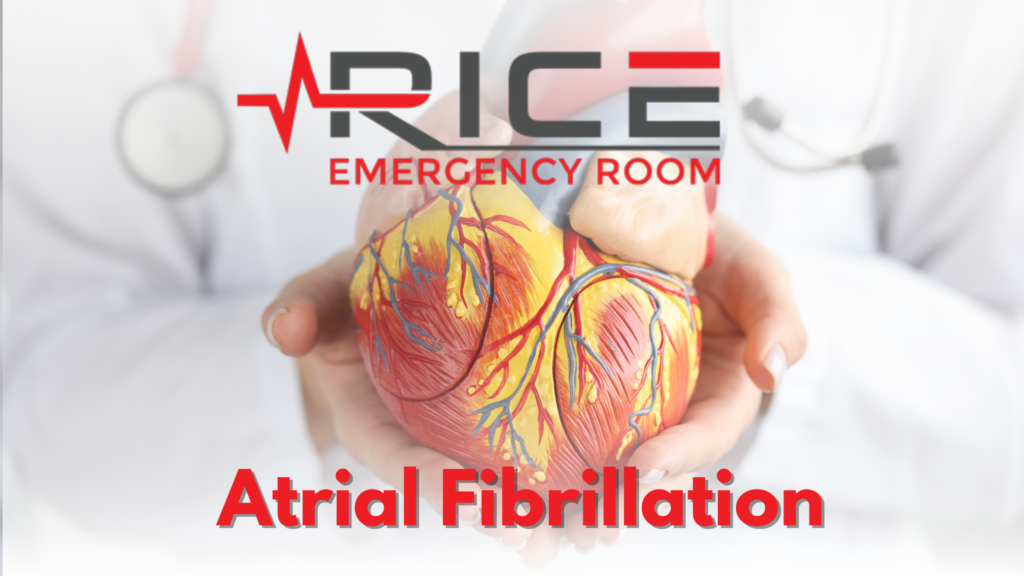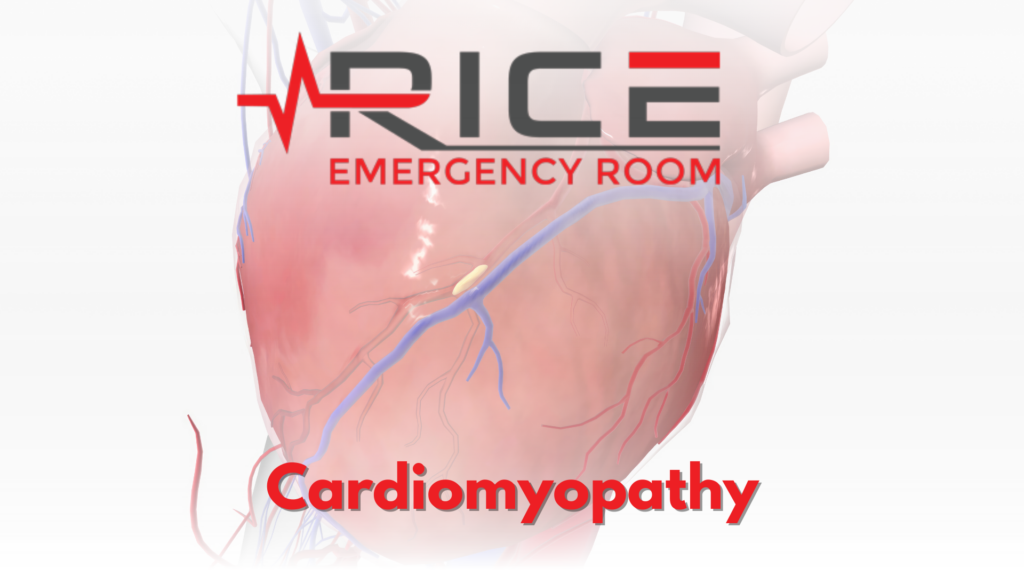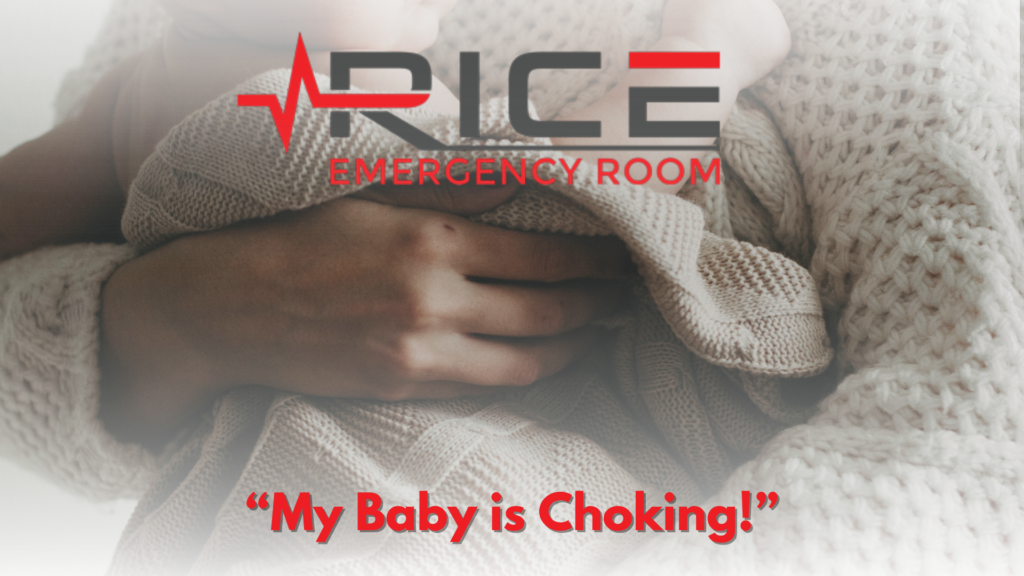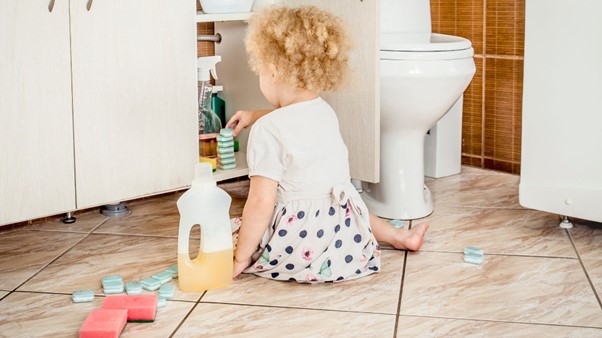
Recognizing 60 Years of Poison Awareness and Control
Poison Prevention Week is a reminder to all of us that we have to be intentional with poison control, especially with children. Nearly nine out of 10 unintentional poisonings occur in the home. On average, 31 children under five die in the U.S. each year of unintentional poisonings from consumer products found in the home.
This is a decline of 80% from 1972 when 216 children died. In 2018, the number of reported fatalities dropped to 17, the lowest figure since reporting began in 1972.
Unfortunately, fatalities have increased in recent years. Pediatric poisoning fatalities doubled to 34 in 2019 and increased by 26 percent in 2020, reaching 43 fatalities for the year. Narcotics, such as opioids, made up almost half of these deaths. (Poison Prevention 2023)
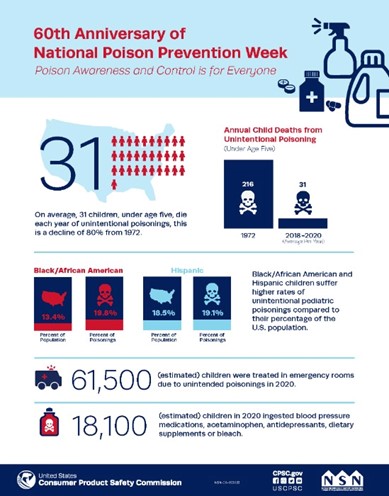
Poison Prevention Week is an important annual event that reminds us of the dangers of poisoning and provides information on how to prevent it. This year, Poison Prevention Week takes place from March 21-27, and it is a great opportunity for individuals and families to learn about the steps they can take to keep themselves and their loved ones safe from poisoning.
Steps You Can Take to Prevent Poisoning
There are many steps you can take to prevent poisoning in your home. Here are some important tips to keep in mind:
Store Medications Safely: Medications, both prescription and over-the-counter, can be dangerous if taken improperly. Ensure all medications are stored out of reach of children and in their original containers with the labels intact. Be sure to dispose of expired or unused medications properly, and do not flush them down the toilet or throw them in the trash.
Store Household Chemicals Safely: Household chemicals, such as cleaning products, pesticides, and gasoline, can be toxic if ingested. Store these products out of the reach of children and in a locked cabinet if possible. Keep these products in original containers with the labels intact, and never store them in food or beverage containers. (Prevention tips 2020)
Be Careful with Common Household Items: Many common household items can be toxic if ingested, including batteries, magnets, and small toys. Keep these items out of reach of children, and supervise young children when they are playing with toys or other items that could be swallowed.
Be Aware of Potential Poisoning Hazards: Some potential poisoning hazards may be less obvious, such as carbon monoxide, lead, and asbestos. Ensure your home has working carbon monoxide detectors, and be aware of any lead or asbestos hazards.
Be Aware of Poisonous Plants: Many common household plants, such as lilies, azaleas, and philodendrons, can be toxic if ingested. If you have plants in your home, research them to ensure they are safe and keep them out of reach of children and pets.
Be Careful with Food and Beverages: Food and beverages can also be sources of poisoning if not handled or prepared properly. Remember to wash your hands and any cooking surfaces before preparing food, and follow safe food handling practices. Be sure to store food at the proper temperature, and avoid consuming any food or beverages that look or smell unusual.
Teach Children About Poison Safety: It is important to teach children about poison safety from a young age. Teach them never to touch or taste any medication or household chemicals and to tell an adult if they find something that looks dangerous. Encourage children to ask questions if they are unsure about the safety of a particular item or substance.
Know the Poison Help Line: The Poison Help Line, 1-800-222-1222, is available 24 hours a day, seven days a week, and can provide information on what to do in case of poisoning. Keep this number handy in case of an emergency.
In addition to these steps, being aware of the signs and symptoms of poisoning is important. Symptoms can vary depending on the type of poison and the amount ingested but can include nausea, vomiting, abdominal pain, confusion, and difficulty breathing. If you suspect someone has been poisoned, it is important to seek medical attention immediately.
Works Cited
Poison Prevention. U.S. Consumer Product Safety Commission. (n.d.). Retrieved March 9, 2023, from https://www.cpsc.gov/Safety-Education/Safety-Education-Centers/Poison-Prevention-Information-Center
Prevention tips. Prevention Tips | Poison Help. (2020, August 14). Retrieved March 9, 2023, from https://poisonhelp.hrsa.gov/what-you-can-do/prevention-tips

